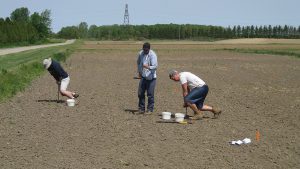The only certainty
FROM THE CEO'S DESK

WHEN A MAJOR international trade deal is signed, images of a handshake between the nations’ leaders are shown across the evening news and printed in the papers. It’s a symbol of a promise made in good faith, and a signal that despite the tough negotiations and concessions made on either side that all parties are accepting of the terms.
At least, that’s what a handshake used to mean — nowadays it seems like it’s just a photo op designed to bolster political reputations in the hopes it will translate into votes at the polls. People are impatient, they change their minds quickly, and no political leader can afford to be seen supporting the wrong side of public opinion.
I’ve stated before that Grain Farmers of Ontario is in support of broader access to international markets for our grains to ensure the future viability of our industry. In the past, we have been able to rely on strong trade agreements based on sound economic benefits to secure that broader access and create some level of certainty for markets.
However, when trade agreements are made (or broken, as the case may be) for political capital, it creates a level of uncertainty that can send global markets on a roller coaster ride.
The UK is in the midst of figuring out what their trading relationships will look like post-Brexit. Once Britain officially breaks ties with the European Union, they will be able to make their own trade deals. Currently, negotiations are focused on the details of how the UK will leave the EU, such as the free movement of goods, services, money, and people, and that’s making some people who were originally in favour of leaving the union reconsider their position. Some polls show the majority of citizens no longer want to leave the EU; but some political leaders, including British Prime Minister Theresa May, are steadfast in their plan to see the exit. However, May misjudged the support she had for her Brexit plan even within her own party and may not be able to get the deal through the House of Commons. An alternative plan may have to be considered, or there could be no Brexit at all — no one is certain what will happen.
For a while, it seemed like Canada might have some benefit from the U.S. — China trade war. As they leveed tariffs against each other, Canadian goods were a better economic option. But then, a Chinese businesswoman was arrested in Canada with the possibility of extradition to the U.S, and that put Canada on uncertain ground with China. Three Canadians have since been detained under various circumstances, and it’s not clear how this will affect the discussions that were underway to develop a Canada — China free trade agreement. China’s rising middle class continues to increase the demand for imported goods, including agricultural products, and it’s a market Ontario farmers need to be able to take advantage of.
Perhaps the biggest uncertainty is the United States. The U.S. political landscape has changed with the Democrats taking control of the House of Representatives amongst a government shutdown. President Donald Trump himself creates a level of uncertainty with comments on social media that are actually affecting the markets and international relations. In addition to his dispute with China and other world leaders, Trump is also trying to influence trade issues closer to home. The United States-Mexico-Canada Agreement (USMCA) still has not been passed by Congress. Democrats and even some Republicans oppose the agreement and Trump has threatened to terminate NAFTA in order to pressure Congress into ratifying the USMCA. If that happens, trade could revert to pre-NAFTA terms. The U.S. is our largest trading partner and having a secure and open trading relationship is key to economic growth within a number of sectors.
As political leaders around the world balance between globalization and protectionism, they do not seem to be focused on the long-term impacts of their decisions. We need to hold them accountable. I don’t know what the future of some key trade agreements will be; all I know for certain is that we will face more uncertainty in the months ahead as politicians figure it out. •


























